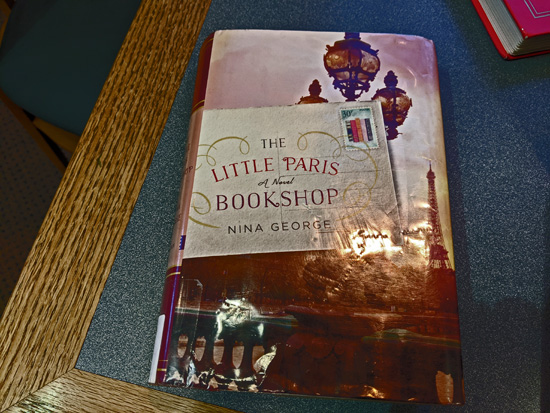My third book of the year called out from the shelf of a bookstore with a title that would entice any avid reader: “The Little Paris Bookshop.”
Even before opening author Nina George’s work, you’re thrown into the romantic idea of stepping aboard a barge filled with books in the middle of Paris and what it must feel like to step back on shore with a new work in hand and nothing to do but sit by the river and let the afternoon pass you by.
What follows is a perfectly nice journey of love and looking for love and romantics who are all too happy to encourage such actions by others they meet. And of course there’s the bookshop, named The Literary Apothecary because as the owner puts it, there are “little feelings and emotions no therapist is interested in, because apparently too minor and intangible.” Jean Perdu is there to fix those problems by putting just the right book into your hands at the right moment in your life.
Much of the book is about his search to solve what’s going on in his head and his heart, but always at the core is that idea that books are something special to be both cherished and feared, and recognized for their power over those willing to accept it.
But as Perdu says, that power only goes so far:
“That is the only tragic thing about books: They changed people. All except the truly evil, who did not become better fathers, nicer husbands, more loving friends. They remained tyrants, continued to torment their employees, children and dogs, were spiteful in petty matters and cowardly in important ones, and rejoiced in their victims’ shame.”
One thing I really enjoyed about George’s writing is that it is evocative in terms of time and place, really putting you in the setting in a way where you can feel the creaking of the little bridge between the book barge and the shore, or the wind blowing over the countryside as Perdu escapes the city.
On particular section really made me feel like I was back on a trip I took with my wife to California, where we stood in the silence of vast national parks and marveled at the awesomeness of that peace and the way the air felt different.
“That was exactly how Jean Perdu felt now, overrun by hyperintensive perceptions he had never experienced in the city. How his lungs hurt when he took a deep breath! How his ears popped in the unfamiliar liberty of peace. How his eyes were restored by the sight of living shapes. The fragrance of the river, the silken air, the vaulted open space above his head.”
Overall I found the story dragged a bit too much for my taste, but not too the point of not enjoying it. And I have to give credit for a truly funny bit that took place when Perdu helped out a new neighbor who moved in across the hall and she left a note asking if he would please join her for dinner:
“P.S. Bring a plate. Can you cook? I can’t.”
